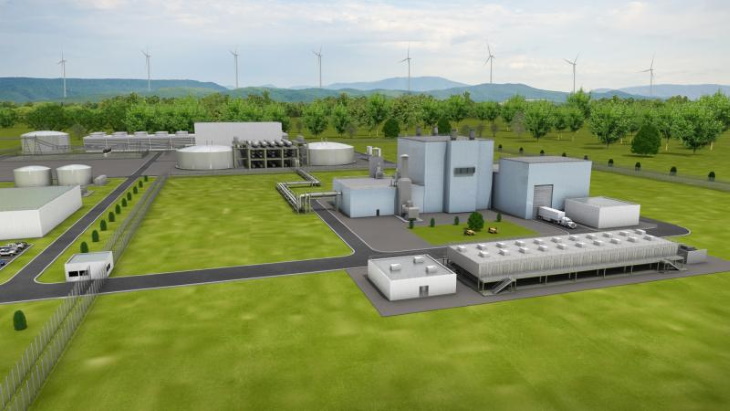Natrium is part of the US Department of Energy's (DOE's) Advanced Reactor Demonstration Program, which aims to speed the demonstration of advanced reactors through cost-shared partnerships with US industry.
TerraPower says Natrium's novel architecture simplifies previous reactor types. Non-nuclear mechanical, electrical and other equipment will be housed in separate structures, reducing complexity and cost. The design is intended to permit significant cost savings by allowing major portions of the plant to be built to industrial standards. Improvements use fewer equipment interfaces and reduce the amount of nuclear-grade concrete by 80% compared to large reactors. Natrium reactors are designed to provide firm, flexible power that seamlessly integrates into power grids with high penetrations of renewables.
The Natrium system features a 345 MWe sodium fast reactor and can be optimised for specific markets. For instance, TerraPower says its thermal storage has the potential to boost the system's output to 500 MWe of power for more than five and a half hours when needed.
"This allows for a nuclear design that follows daily electric load changes and helps customers capitalise on peaking opportunities driven by renewable energy fluctuations," the company said. "The Natrium system demonstrates the benefits of modern virtual design and construction tools."
TerraPower says the system "has attracted the attention of numerous utilities". Berkshire Hathaway Energy subsidiary PacifiCorp, Energy Northwest and Duke Energy have expressed their support for the commercialisation effort, it said.
"As a nuclear innovation company, TerraPower values collaboration with GE Hitachi to make nuclear generation as affordable as possible," said TerraPower President and CEO Chris Levesque. "Our exceptional technology development capabilities, unmatched financing credibility and achievable funding strategy mean that the Natrium technology will be available in the late 2020s, making it one of the first commercial advanced nuclear technologies."
"Our collective experience brings unparalleled capabilities in design and construction that ensure the Natrium product can drive value for our customers," said GEH President and CEO Jay Wileman. "We designed this system with operator input to potentially increase their revenues by 20% through the use of energy storage."
Initially developed in the 1950s, the travelling wave reactor (TWR) design resurfaced in the early 1990s, and was later patented by Intellectual Ventures, the company from which TerraPower was spun out of. The TWR is a liquid sodium-cooled fast reactor that uses depleted or natural uranium as fuel.
The core design of the original TWR concept envisages a moving region, or 'wave', in which the uranium is bred progressively into plutonium, which is the actual fuel that undergoes fission. However, in mid-2011 TerraPower announced a change of design to a standing wave reactor in order to address the problem of cooling a moving region. The current design would start the fission reaction at the centre of the reactor core, where the breeding stays, while fresh fuel from the outer edge of the core is progressively moved to the central region, as used fuel is moved out of the centre to the periphery.
TerraPower - a company largely funded by Microsoft founder Bill Gates - plans to build a 600 MWe demonstration plant, known as the TWR-P, followed by larger commercial plants of 1150 MWe.
TerraPower is also developing the Molten Chloride Fast Reactor (MCFR). In January 2016, DOE awarded a five-year, USD40 million cost share award for continued research and development into TerraPower's MCFR project. This award served as the inception for a new, public-private, MCFR project development partnership that includes: TerraPower, Southern Company, Oak Ridge National Laboratory, the Electric Power Research Institute and Vanderbilt University.
Last week, Battelle Energy Alliance announced it had begun contract negotiations with a team led by Bechtel National Inc and including TerraPower and GEH to support the design and build phase of the Versatile Test Reactor. The reactor will be a one-of-a-kind facility that would support research and development of innovative, clean nuclear energy technologies.















